Brokenness & Hope
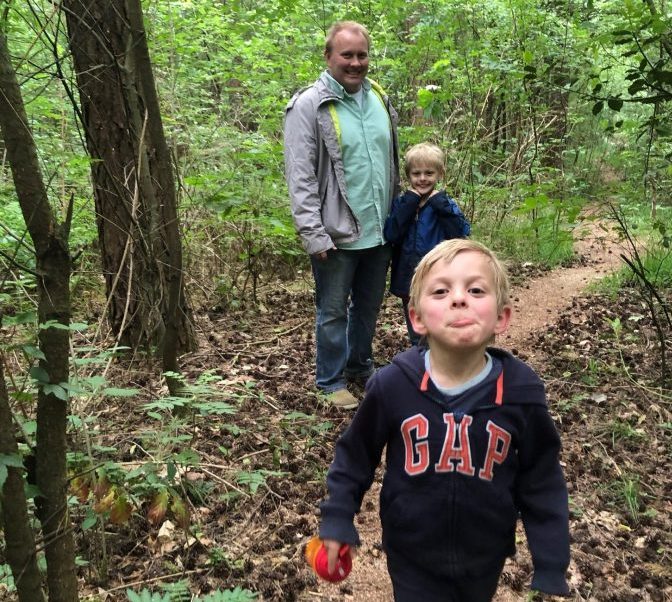
It has been a muddled few months. I’d moved houses, my children were at home, and the Coronavirus lockdown oppressed the city with its depressing quiet view. The only lights flickering through my days were the gorgeous spring weather and my WhatsApp messages. I’d barely gasped for air between unpacking boxes before Ariadna, the American Women’s Club VP of Membership reached out to me – “What do you think about this?”
I give authority to whoever has a good idea. “Go for it,” I said, and I went back to laundry/homeschooling/the Board Meeting agenda.
About a month ago, I clicked on the ZOOM meeting invitation Ariadna had sent the membership. I wasn’t sure what to expect – it wasn’t International Cooking, a Book club Discussion, or a Yoga practice – but I opened the invite as if skimming the pages of a freshly printed novel. I was looking for a perspective. A thought. An insight. The speaker was Carol and I know from interviewing her before, that she has been a member of our American Women’s Club for eleven years. Carol has a history of being a breast cancer patient, and a survivor. I knew her mother had breast cancer and her sister. I know that she had a friend who wrapped a towel around her side that brought her relief, which inspired her to lead the Caring Hearts Project. Because we are friends, I know she is a compassionate and inspiring individual. I logged on to Carol’s virtual “Waking Up to Brokenness” presentation not knowing what to expect but smiling with appreciation before she even began.
With words, she illustrated her journey – the diagnosis, the aftermath. “I’d wake up every morning, hoping for this not to be true,” and then after a few moments, she’d realize. . . that everything was broken.
How many of us have felt that way? Those few seconds between dreaming and waking – when the sheets are wrapped around you, sunlight peeking under the shutters or blinds, and in that blissful moment everything is as it should be. The miscarriage is still growing. The relationship is intact. The diagnosis is undiagnosed. But then, as your subconscious becomes conscious, the weight of the truth begins to suffocate your spirit, and getting out of bed becomes the most impossible task of the day.
There’s a Japanese term, Kintsukuroi, which is a kind of Japanese style. It means “to repair with gold,” and in the Kintsukuroi tradition when a ceramic piece breaks, an artisan will fuse the pieces back together using liquid gold or gold-dusted lacquer. So rather than being covered up, the breaks become more obvious, and a new piece of art emerges from the brokenness.
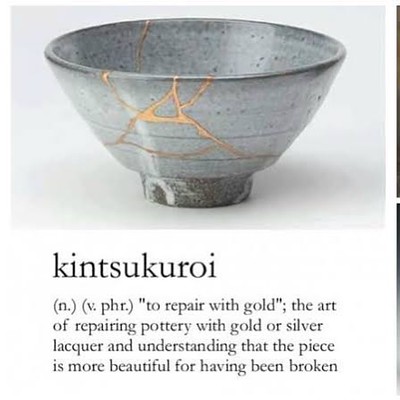
I’d read about this Japanese concept earlier this year, this celebration of brokenness and becoming whole again, and I nodded when Carol brought it up as part of her presentation. My good friend Michael, my ‘big brother’ in Texas, has given me similar advice before. “In your life you’re going to have ups and downs. That’s just how it goes. Perhaps you’re in a really low point right now, maybe the lowest, but then. . . you’re going to climb back up again. Celeste,” he reassures me, “my life has taken so many twists and turns and I never thought would happen, but, here I am. You’re going to be okay, whatever direction you choose; you’re going to be okay.”
Carol questioned the purpose of such agony or despair – but without adversity, then how would we even know what we are capable of, grateful for, would we miss the seemingly mundane details in life dismissing the beauty with a passing thought?
“Once you face death or darkness – you view everything around you with a new perspective. . . your senses are heightened.” She acknowledged that even amid this pandemic, we’ve experienced one of the most beautiful springs on Belgian record. The sun has shone brighter, the flowers bloomed brighter, and the air. . . of course, is cleaner because of the less traffic on the road. Even the Belgian news reported that the Brussels police department had received numerous calls from citizens. . . reporting a ‘toxic odor’ in the air. For centuries, I’m sure, farmers have used cow manure to fertilize the crops surrounding the Capitol city. It wasn’t until the Coronavirus squelched the automobile traffic and corresponding exhaust that the air cleared enough to smell the manure.
“Hope springs eternal,” Carol continued, and I leaned into my computer, “in dire circumstances the human heart can still hope. You can choose to suffer, to be a victim, or you can look for the collateral beauty.” I scribbled collateral beauty on a page of white paper.
I’d written about it in a letter to our membership – about how. . . for the most part the lockdown isn’t that bad or unusual for our family, but it’s an inconvenience. I’ve reminded my children how fortunate we are – we have our health, our family, Daddy has a job . . . but yet, as they cry about missing their friends, complain about being lonely or confined, I know their feelings are valid. The whole world is sad right now. We’re all having a hard time. Not just our family, or our city, or even our country. The whole world! I remind them that everyone misses their friends. Everyone must do homework at home. We’re not special with our struggles. And I remind them that there are so many good things that have come out of this. We’ve talked to friends in Texas and the Netherlands much more than we ever had before. In our expat life, we were always the lonely ones, reaching out to friends back home. Now, with a tiny taste of isolation, they understand how much a simple phone call means to someone.
Carol defined the word hope: “Hope is an optimistic state of mind, a desire for things to change for the better. Hope is an anchor to overcome and endure. Hope is not something you can see, but it is believing in what you can not see. Take away the ability to hope and that’s when despair sets in. Sometimes hope is false and disappoints. When a person sees no possibility of change, then they lose hope. That’s when fear takes over.”
Last week was a difficult week. I don’t know if it was the moon or stars, the weather, hormones, or just that we’ve been doing this gig for nine weeks, but the family and I were struggling. I ran sixteen miles in four days because it was my only excuse to get away, to get my space. Holden, my eight-year-old had taken to flopping on the couch with an exasperated wail each time we asked him if his homework had been completed. We won’t even talk about the feral unruly attitude and misbehavior of the five-year-old. Even my sweet Cosette, the 10-year-old who has been our rock – making To-Do Lists and schedules, completing her homework by noon every day and then helping Holden with his, wavered in her conviction that everything was going to be okay.
One night last week, I just lost it. The constant cooking, the endless cleaning, the noise, the claustrophobic space, the nagging feeling that I just wanted to sit and send an email/write/read a book/much less do laundry/clean a bathroom/tidy my kitchen or do anything productive without being interrupted 100 times just. . . got to me. I saw a calendar of months. . . months! Stretching on until September before I’d have a quiet hour of peace in my house again. But more than my own struggles, I was worried about the increasing restlessness and frustration of my children. I saw them losing their grip too – they want to be able to see their friends, their teachers, their school. They want their space. To be themselves. I realize, this past week, we had all lost hope.
I lost it after nine weeks of quarantine and the fact does not escape my attention that the summer holidays in Belgium are for the months of July and August, approximately eight weeks. Being at home with the kids every summer is not that much different than what we’re doing now . . . but for the past few years, as the first day of school loomed on the calendar on September 1st, I’ve always felt like it was the perfect amount of time to be at home.
Coincidentally, when my family and I were starting to unravel last week, 16,000 Doctors in Belgium signed a petition to allow the children to go back to school starting in June. Currently 1st, 2nd, and 6th grades returned for two days a week. (My children are in Kindergarten, 3rd, and 4th – Go Fish.) After all this time in one of the strictest lockdowns in Europe, perhaps I should be more fearful of the Coronavirus – but the emotional impact of all this scares me too.
“It’s not enough just to have hope,” Carol suggested, “You have to do something about it. Put hope into action.” As I also like to think and say. . . Sometimes we’re waiting for the world, and sometimes the world is waiting for us.
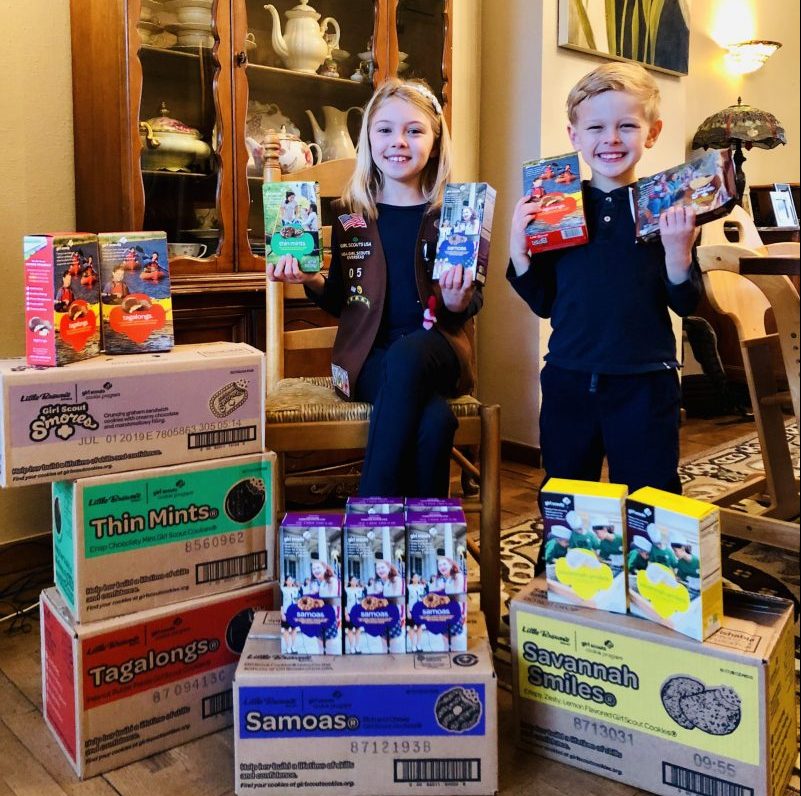
This past weekend, with restrictions finally lifted, we delivered boxes of Girl Scout cookies. Their brightly colored boxes have been occupying space and tempting us with promises of indulgence for the past few months, and I needed them out of our house. Our deliveries took us to friends all over the suburbs and the city of Antwerp. Each of my American Women’s Club friends greeted me and my children with huge smiles, from-a-distance hugs, and lots of conversation. We’ve missed each other, starving for personal contact, and it was the most fun my family has had in months. It was a delivery of an American cookie tradition, a support of a Girl Scout organization, but it was mostly an excuse to go and say hi to friends.
We swapped information, news, cookies, and cash with everyone from doorsteps:
I talked with a member of the club who was “thrilled to see the AWCA supporting the Sustainable Development Goals of the UN!”
“You guys should go walking in the Fort II – it’s just right over there,” a member of the club suggested during a Samoa drop off.
My children were chasing cats in the front yard while my husband and I discussed expat-logistics with friends in Brasschaat with boxes of Lemonade cookies between us, “As many of a third of the expats in Antwerp may be sent home because of the Coronavirus,” they said.
“My husband just texted me, they might be opening the schools back up in June,” one of my friends told us after Cosette handed her a box of Thin Mints. We returned to the car, and Vinny already had the article up on his phone. A little bit of hope on the horizon. Things may return to normal, even if it is a new normal.
Yesterday, we continued to deliver Girl Scout cookies to a friend in the AWCA who led us to the stables behind her house. My children, my husband, and I were introduced to her three horses, two dogs, and three cats. We fed the horses carrots, my husband hoisted my daughter on to the back of the tallest, most gorgeous horse I’d ever seen, and we learned a little about caring for and showing horses. With her and her husband, we tromped through the forest by her house and my children raced her 1-year old puppy through the woods – all four of them competing for the Most Energy Award. “Your children are so cute. Your crew is welcome here anytime,” she told me as they raced through the forest. The trees soared above us and I gazed at my own children from a distance. Collateral beauty. She blew a whistle and her dog returned to her. I yelled “statue!” and my kids froze on the trail, for the most part.
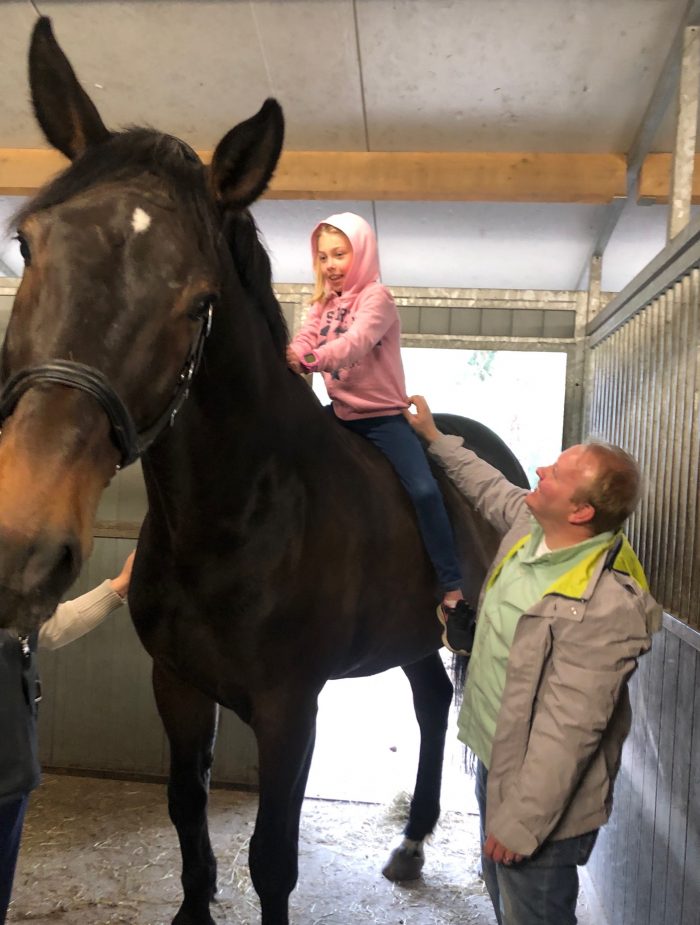
“Thanks, I really needed to hear that. It’s been. . . a time.”
After we returned home and tucked the kids into bed, I had a ZOOM call with a few of my longest and best mom friends in the Netherlands last night. And I was reassured – as lonely as many of us feel most of the time, and just as I’ve comforted my children, that I’m not alone.
Meeting people, exploring new places, and exchanging stories for a weekend lifted my and my family’s spirits and our hearts. Not all is lost. “It’s not going to be a broken old thing that we will return to,” Carol reminded. Although it sometimes feels that way. “It’s going to be a new thing.” Like the ceramic piece fused with gold. That’s all we can hope for.
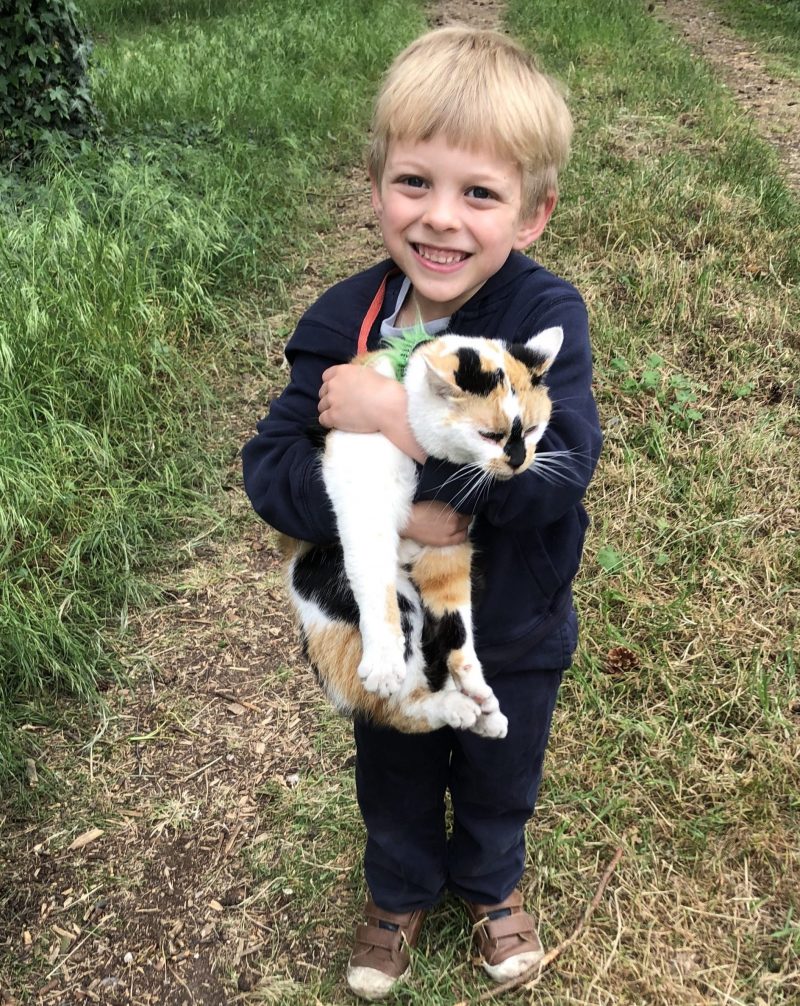
-
-
-
-
/ 0 Comments